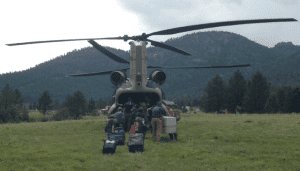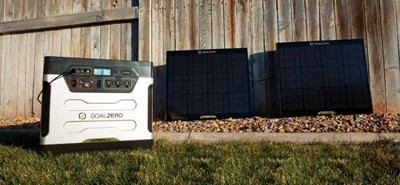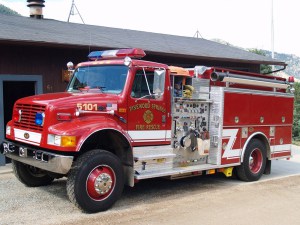[NOTE: The following article comes from one of our Colorado readers, who experienced firsthand the devastating floods that have displaced so many folks. Let us take this event to highlight the need for preparedness, but also be aware that situations can present themselves that one cannot prepare for. If you were affected by the Colorado flooding, please share your thoughts and experiences in the comments section. Stay safe out there, folks. ~ Jason]
For the past year, I’ve lived in a valley at 6,500 feet, in a small community of homes tucked in the mountains of northern Colorado, surrounded by national forest. It’s just a fifteen-minute drive down the mountain to Lyons, a surprisingly vibrant town of 2500 or so that’s now drowning in water, sewage, and pieces of people’s homes, and has been since the early hours of Friday, September 13.
I was with some friends at the Distillery in Lyons the night of the floods, but made it back up the mountain before the water tore through town in the middle of the night. It’s now several days later and entire neighborhoods are gone, the water is contaminated with E. coli, the infrastructure is destroyed, the St. Vrain River is now somehow a few hundred yards south of where it was, and most everybody in town is displaced for several months – or permanently.
Meanwhile, back at the homestead on that fateful night, we quickly lost power, water, phones, etc. By morning, the bridges connecting various parts of the community were destroyed, the highway connecting us to the global supply chain had succumbed to falling boulders and mudslides, and the more precarious parts of the winding mountain road collapsing into the valley below. Unlike in Lyons, the houses, for the most part, were spared, but the community was completely cut off.
 This was our situation for a few days, until somebody somewhere ordered an evacuation. My girlfriend Maggie and our friend Bernie (visiting from NYC) took the first helicopter out with our dogs – the only helicopter that day, as it turned out, since the storms kept rolling in. I stayed behind for a couple of days until the storms finally passed, locking down the house and acclimating to a new reality, one in which I’m abandoning my home in the deafening roar of a Chinook helicopter, clutching my cats in a duffel bag.
This was our situation for a few days, until somebody somewhere ordered an evacuation. My girlfriend Maggie and our friend Bernie (visiting from NYC) took the first helicopter out with our dogs – the only helicopter that day, as it turned out, since the storms kept rolling in. I stayed behind for a couple of days until the storms finally passed, locking down the house and acclimating to a new reality, one in which I’m abandoning my home in the deafening roar of a Chinook helicopter, clutching my cats in a duffel bag.
This was literally a thousand-year event. Only 1% of Colorado homes are even covered by flood insurance. People are displaced up and down the front range. I’m writing this from a hotel room in Boulder. I have shelter and kind people looking out for me, and a computer to share my lessons learned, in medias res, from this very wet "dry run" for the apocalypse.
Power
 Generally speaking, I’m prepared for minor catastrophes as part of a larger strategy of mitigating exposure to systemic risks. The goal is genuine autonomy, for various reasons, but it’s a ways off. Money and time constraints, conflicting priorities, etc.
Generally speaking, I’m prepared for minor catastrophes as part of a larger strategy of mitigating exposure to systemic risks. The goal is genuine autonomy, for various reasons, but it’s a ways off. Money and time constraints, conflicting priorities, etc.
I purchased a solar-powered generator instead of a gas generator, banking on Colorado’s 300+ days of sunshine to get me through a long emergency. It’s basically a big battery that you charge with solar panels. I usually leave it topped off in case there’s, you know, an emergency, but we’d used it the week before at Maggie’s pop-up shop in Lyons, so we were starting out with only a 50% charge.
Also unfortunately, this was a particularly dreary disaster with no sun, so we couldn’t recharge. A gas generator as a back-up to the back-up would’ve been helpful, though it’s better to just not need electricity.
We used it here primarily to power up the satellite Internet and wireless router for brief moments to check on what was going on. If I’d had a small fridge, I might’ve used it to power that but given the limited supply of energy probably not.
The other thing of note: The house I moved into has a grid-tied solar photovoltaic system on the roof. Great for offsetting your carbon footprint and softening the impact of future energy-price volatility. Not so great at actually powering your house during a grid-down disaster. The system’s sole contribution to our plight was to display an error code indicating that its connection to the grid had been lost. I’m sure there’s a way to set it up with a switch or whatever so you can power your house when the grid goes down. Next time, right?
Other than that, we had plenty of batteries on hand to power flashlights, small appliances, etc.
Water
We were starting out with 30 gallons of water brick storage, a Big Berkey ceramic water filter in the kitchen, plus an underground cistern fed by a system of gutters that collects rainwater off the roof. So I felt pretty comfortable about our water situation.
Unfortunately between drinking, cooking, and cleaning dishes, we were going through the water bricks pretty quickly. Sanitation also becomes a problem with no running water; hygiene is difficult, etc.
Our back-up water supply is the underground cistern, but unfortunately the pump we use to get water out of the cistern is an electric pump. I was hoping the electric pump might still work since it’s connected directly to the photovoltaic system, but alas. Luckily the cistern was full from all the flooding, so I was able to reach down and fill buckets of water for flushing toilets and, eventually (if we ran out of storage), for us to purify in the Berkey filter and use for drinking.
If you can solve a problem without electricity (e.g., if I had acquired a hand pump), solve it without electricity. Electricity is not a basic component of human life, unlike water, sunlight, and food.
Food
I have several months worth of beans, rice, freeze-dried vegetables and fruits, grains, etc. stored in #10 cans. I bought all of it from a reputable food storage supplier rather than can things myself just so I could get it done. Most of this stuff will last for 30 years.
We didn’t have to hit our reserves during this time. Obviously eat your perishables first. We grilled fish till it went bad.
Had to abandon our food garden prior to harvesting it, unfortunately.
Heat
Our most egregious mistake was getting caught with no firewood. We were cold and wet for days. I’m still cold. I feel permanently cold.
Fortunately, our stove is connected to propane, so we could boil water and soups. I drank hot liquids compulsively to stay warm.
Medicine
Pharmaceuticals are the dark secret of any widespread supply-disruption crisis. Imagine, for example, all of the millions of people dependent on SSRIs for everyday functioning suddenly wandering around suffering from intense, debilitating withdrawal. I can’t even really imagine it. If you can avoid dependence on pharmaceuticals that because of insurance restrictions limit you to a 30-day supply, avoid it. Seek alternative treatments where possible, preferably treatments you can make or grow yourself.
In a disaster situation, if you are running low on Rx and you have a chance to evacuate, do it. You don’t know when you’ll be able to resupply.
Otherwise, we had plenty of bandages, ointments, aspirin, etc.
Community
 Our community has its own volunteer fire department and leadership. They mobilized immediately, creating a program to canvas the neighborhood for residents in need of help, checking the homes & pets of people who were out of town, establishing radio contact with emergency workers, etc. Everybody would gather at the firehouse twice a day to get updates on the status of the neighborhood and word from outside.
Our community has its own volunteer fire department and leadership. They mobilized immediately, creating a program to canvas the neighborhood for residents in need of help, checking the homes & pets of people who were out of town, establishing radio contact with emergency workers, etc. Everybody would gather at the firehouse twice a day to get updates on the status of the neighborhood and word from outside.
There’s also a bakery on the highway near the firehouse, where people would bring food that hadn’t spoiled yet, spare fuel, etc for the rest of the community, the bakery becoming a safe haven and welcome reprieve for people with unsanitary conditions at home.
Most everybody was evacuated last Monday, but a few stayed behind, even if it means toughing out a winter with no access to the outside world, possibly without electricity or running water. Their attitude is that they don’t need the world or what it has to offer. They understand the inherent risks in abdicating control of the basic components of human life to an increasingly unstable system of systems, all of it powered by an unsustainable cycle of subjugation and suffering. They understand the risks and dismiss the benefits. It’s really that simple.
I am looking forward to rejoining them sometime in the Spring.
~ Latersbrau
This is a companion discussion topic for the original entry at https://peakprosperity.com/surviving-the-colorado-floods/